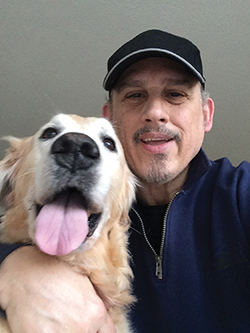Bladder Cancer Survivor
Never Settle For Less
 From the moment he received a diagnosis of bladder cancer at 49, Fred Almeida adopted the mentality of a fighter. He researched potential treatments and stood his ground. Now he is living a full life and managing recurrences when they happen with hope and courage. He encourages others to do the same.
From the moment he received a diagnosis of bladder cancer at 49, Fred Almeida adopted the mentality of a fighter. He researched potential treatments and stood his ground. Now he is living a full life and managing recurrences when they happen with hope and courage. He encourages others to do the same.
I was diagnosed with transitional cell carcinoma, Grade 1 of 3, at 49 — a relatively young age for this type of diagnosis. It started when I felt a slight abdominal pain during the night with no relief when attempting to urinate. Being out of the norm for me, I went to my internist who sent me for a sigmoidoscopy, which came out negative. This internist, who serendipitously was standing in for my usual MD, ran a series of tests. The results showed four to five blood cells in my urine. She sent me for a CT scan, which showed a protrusion in my bladder. That resulted in a cystoscopy of my bladder and the diagnosis of bladder cancer.
My diagnosing physician gave me the news in a very harsh and scary way with almost no information or options. I was part of an insurance network that had all urologists under one roof. This made it hard to get an objective second opinion, so I went outside the group. The doctor who gave me my second opinion scared me even further by suggesting removing my bladder. This made me feel like the entire matter was left to me to figure out. After investigating through organizations such as the National Cancer Institute, BCG Oncology and Bloch Cancer Foundation, I came to believe that a transurethral resection for bladder tumors (TURBT) with intravesicle instillation (straight into my bladder) of a chemotherapy drug was the way to go. I chose a urologist in my network who got great reviews. He also felt that TURBT was the way to go, but I had to convince him to instill the chemotherapy. It was a bit of a struggle, but he agreed.
Because I had multiple tumors throughout the lining of my bladder, I had two TURBTs to remove them. In each case, the surgery was followed with an intravesical instillation of a chemo agent. After the second surgery, I had intravesical immunotherapy and cystocopy checkups every six months for three years, then yearly.
For five years, I had cystoscopies with good results, bolstering my feeling that I had beaten the disease. As I reached the five-year mark, almost to the day, I awoke one morning to horror as my first urine was a bright red. That was the first sign of a fairly large tumor in my right kidney. Much to my surprise, the normal course of action is to remove the kidney entirely. I had a radical nephrectomy to remove my right kidney and ureter. The ureter wasn't affected but has no function without a kidney to support. Subsequent ultrasounds showed that my remaining kidney had grown considerably to compensate. Life went on as normal with the remaining kidney taking over.
After three and a half years, I had another surprise. At one of my six-month cystoscopies, my urologist saw a recurrence in my bladder near my remaining ureter. We tried intravesical immunotherapy to no avail, so my urologist performed a resection of the distal end of my ureter to prevent spreading into my bladder and my remaining kidney.
I returned to a normal life with cystoscopies every six months with good results. Three years later, almost exactly to the day again, my urologist saw a small patch of redness in my bladder. He did a TURBT to remove a small neoplasm at the neck of my bladder. I am currently undergoing weekly treatments for six weeks, to be followed by monthly maintenance for a year. That’s how it goes with bladder cancer. You treat, get continued surveillance until a recurrence, and then it’s back to the beginning until you get good reports again.
I relied on friends for support. A friend came with me to all of my medical appointments. She ensured all our questions were asked and answered, and took notes. It’s hard to do this yourself when you have so much on your mind, and emotions can get the best of you. You think you can do this alone — you can’t.
Therapy has helped me deal with the psychological effects of recurrence. The trick to continued good health is finding the balance between putting events behind you so that you can lead a normal life but not dismissing them to the point that you assume you have nothing to worry about. You still need to continue your surveillance, take the successes and add them to your courage. If you hit a speed bump, take immediate action to put cancer back in its place.
Despite the twists and turns along the way, I live a normal life and am optimistic about the future. I feel not drinking much water in my youth may have contributed to the development of the disease, so now I eat very healthy, drink lots of water and take a multi-vitamin that may help bladder cancer patients. I added vitamin D to my daily regimen as my levels have decreased with age. I think good sleep also is very important for your body to be at its best to perform and fight the effects of treatment.
Always strive for a complete cure and never settle for less. You don’t lose until you lose hope.


